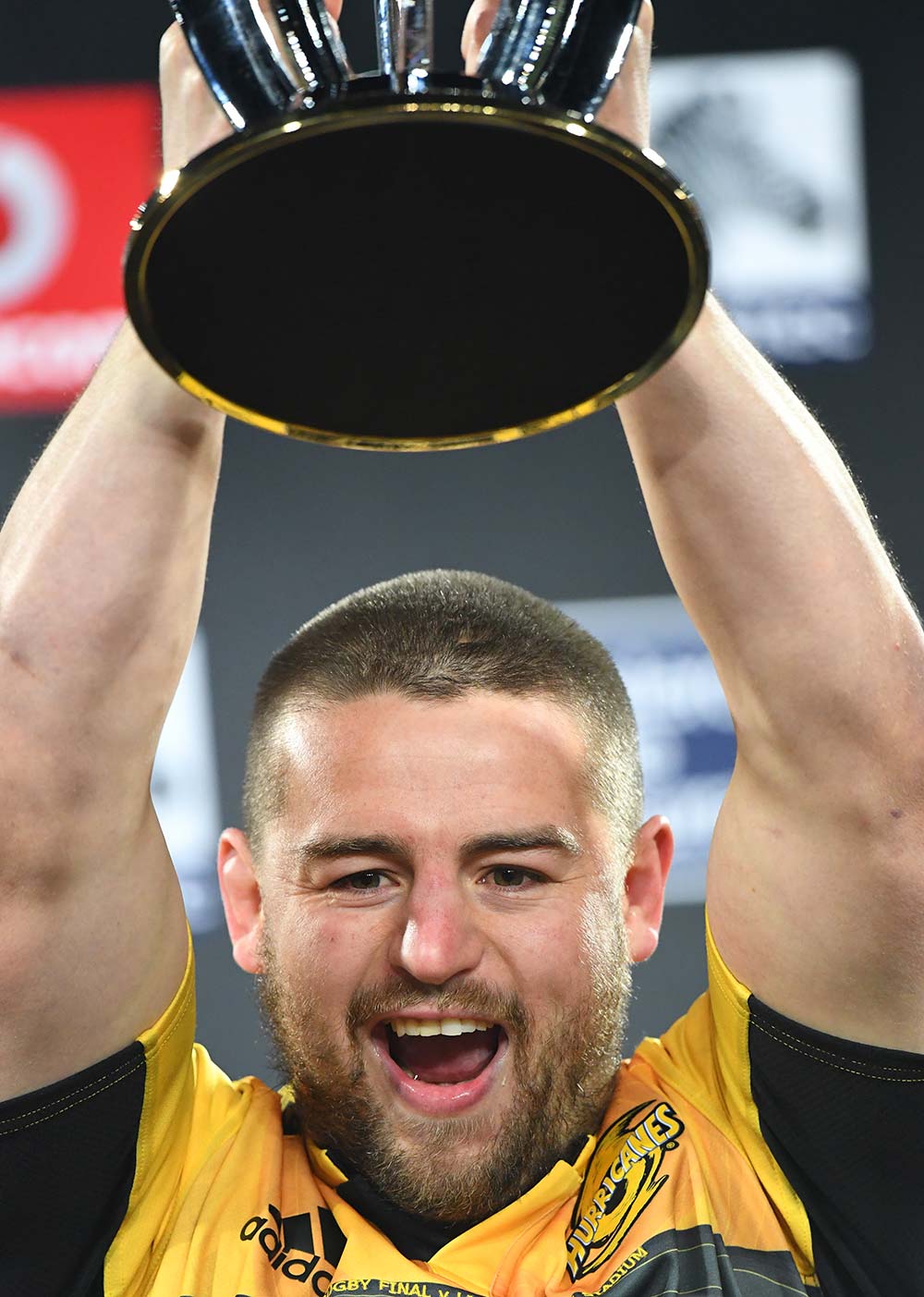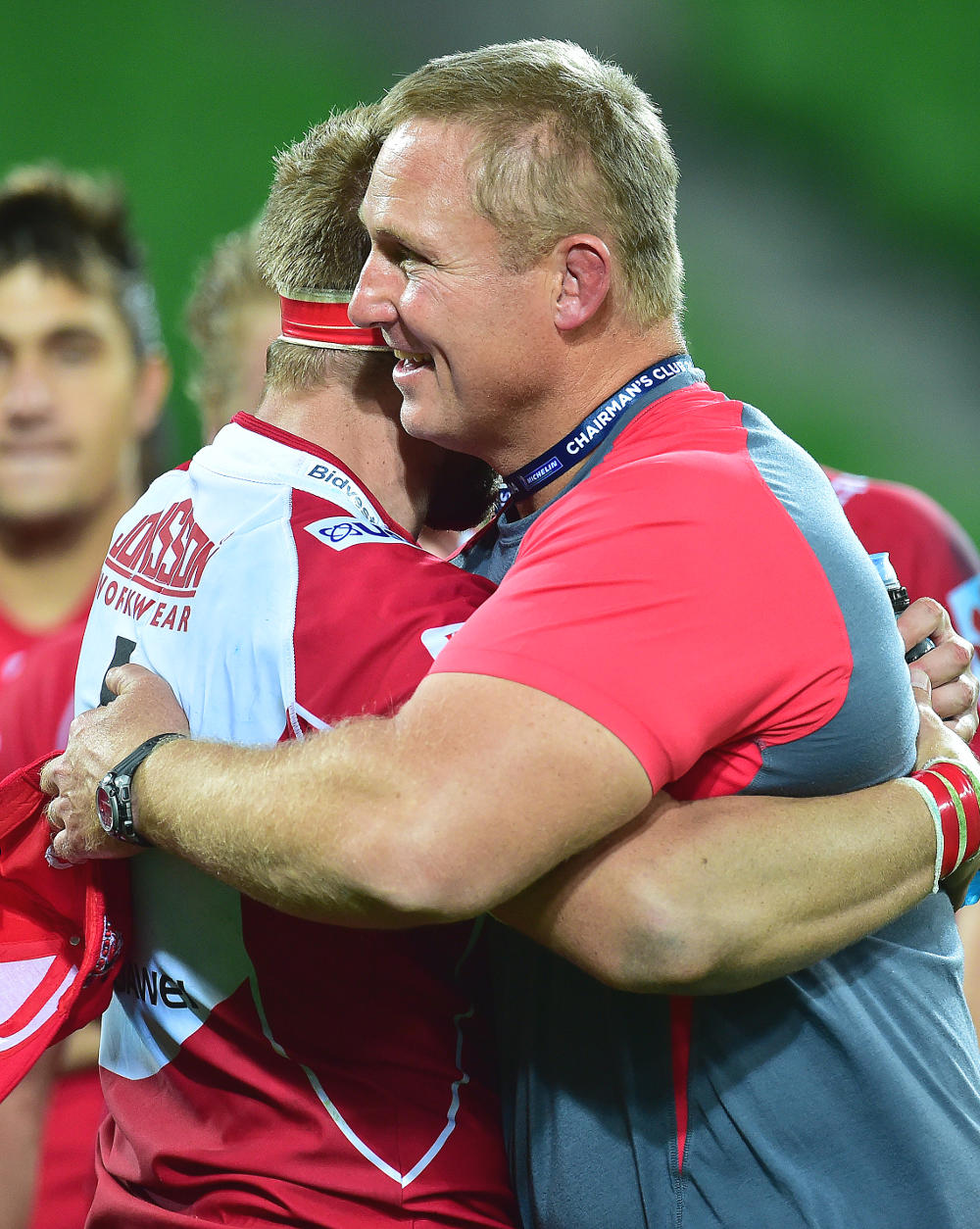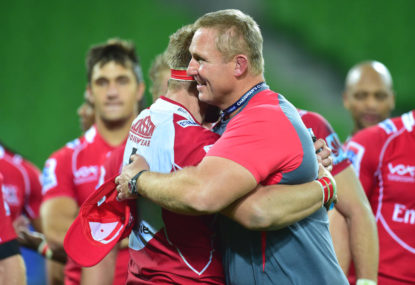Dennis Dugan’s 2008 film “You Don’t Mess with the Zohan” stars Adam Sandler as an Israeli agent who escapes his homeland to follow his dream.
While Lions coach Johan Ackermann hasn’t had to fake his own death as Sandler did, the recent announcement that he is leaving South African rugby to take up the head coach position with Gloucester in the English Premiership came as a huge shock, and is further evidence of the pressures on southern hemisphere rugby from the cashed up competitions of the north.
Taking time out in Melbourne during the middle week of the Lions’ three-match Australian tour, Ackermann very generously and candidly explains the circumstances behind his move: “It’s one of those things that happened very quickly. With all that’s happening at the Lions, with us being such a happy group, you never think that’s something that will happen to you.”
“But when I got the contact I sat down and looked at the challenge of coaching in the northern hemisphere, and I thought to myself, I’ve been so many times to Australia and New Zealand, something like this takes me right out of my comfort zone. I’m going to work with a whole lot of different nationalities, in UK conditions, I get to test myself against French clubs, there’s just so many challenges attached to this.”
With the Lions now clearly ranked as South Africa’s leading provincial side, Ackermann will leave with a clear conscience, having led a cultural change through the Lions organization, which has produced results as well as earning respect from everyone in the rugby world.
“We’ve put a lot of emphasis on driving the same values and way of doing things, and rugby philosophy right down into our juniors. It’s the same culture. My assistant coaches have been there 4 years and 7 years respectively; they will stay behind, as will the core of the playing group. So if there’s ever a good time to leave it’s now,” said Ackermann.
There is of course unfinished business to attend to first; winning the Super Rugby title, after falling at the final hurdle last year.

(AAP Image/SNPA, Ross Setford)
So how does Ackermann assess the season so far?
“I’m happy with where we are (leading the Africa 2 conference with a 9-1 record). If you can control your own destiny by not hoping other teams lose then that’s obviously a good thing. Individually, some of the guys are playing good rugby, but collectively we’re not quite there, for example there aren’t the same long-distance tries like last year.”
“We do have some important injuries, so we don’t quite have the same combinations, the same experience, the same calmness under pressure.”
But the biggest change Ackermann has noticed this year, is not so much with his own team, but in the way opposition teams have prepared; “Last year, sides didn’t take much notice of us. But now, there is no more ‘under the radar’. Teams are now making definite plans to disrupt our play and our fluency. Which means that we too have to evolve.”
That evolution is indeed the real story here; how a side that was relegated from the competition in 2013 not only recovered its position but, in a very short time, became one of the competition heavyweights, and in a manner which has potentially altered the way South Africans now approach their rugby.
While seeds were sown during their 2013 exile, Ackermann describes how changes really started to kick in during 2014. The main catalyst for that change comes as a surprise.
“I remember we played the Chiefs in Hamilton and afterwards we had a great chat with (Chiefs coach) Dave Rennie”, he says.
“I asked him, ‘we watch Sonny Bill (Williams) do these offloads, but what happens when they don’t work?’ And he said ‘we give the guys a basic structure but within that structure is freedom. (Aaron) Cruden can make a decision on the run and we back him and the team will back him.’”
“So what happened after the meeting with Rennie, we focused our coaching on developing the players’ individual skills and, within that basic structure we provide, encouraging the players to use those skills, say to try and evade guys where they can.”
Ackermann goes on to use the Hurricanes to illustrate further: “Their secret is that they always look like they play without fear of losing. Look at a school game where if the ball is passed to the backs and somebody drops it, you’ll invariably hear the coach yell out next time ‘don’t pass it!’ We’re trying to do the opposite. Sometimes we might say to a player afterwards, ‘maybe you should have kicked it there instead of running’, but we never hold anything like that against the players, as long as the effort and intent is there.”
Continuing the New Zealand theme, Ackermann also credits his time under Wayne Smith at Northampton for helping shape his coaching philosophy, as well as Laurie Mains: “he had a certain hardness about him”, and John Mitchell too: “he was very strong technically and he also helped me understand how New Zealand players think.”
Ackermann’s other primary influence was ex-Springbok coach, Dick Muir: “My first coaching job was under him, and what I learned from him was innovation. He was always looking to do something that nobody else was doing.”
So with those influences in mind, what was it that pulled everything together?
“That happened when we decided not to focus on winning Super Rugby or the Currie Cup, but where we all agreed that we just wanted to play exciting rugby,” said Ackermann.
“We also looked at our player profile at the start of 2014. We just didn’t have the kgs to play the big, power, ball-carrying game anyway, even if we’d wanted to.”
That said, what impresses canny observers about the Lions is that, regardless of the emphasis on a fast, running game, marked with offloads and backing-up, at no stage has the set piece been neglected; their line-out and scrum are among the best in the competition.
The fruits of the new approach started to appear in 2015, where the Lions suffered a few close losses to sides they would previously have expected to have been beaten heavily by.
By 2016 there were mid-season defeats to the Hurricanes and Crusaders but then results started to flow/
“The wins came as combinations got better and the players got used to having that freedom. But most of all, with respect to our game, the players got calm,” said Ackermann.
Clearly, not every player brought up in the South African system was suitable for this new style of high paced game, so recruitment has played a crucial role.
“We got a lot of players from the smaller provinces,” Ackermann explains.
“Like Faf (du Plessis) who is from the Pumas. Or we got hold of players who for some reason had not been given opportunities at other provinces, guys like Courtnall Skosan, Warwick Tecklenberg, Robbie Coetzee and Franco Mostert, players who we felt would add value character-wise, but who also had skill and a willingness to play our style of game.”
The final group were players who were already from the union. “Guys like Jaco Kriel and Elton Jantjies, they had been through the tough times, from the U20’s but they’ve really matured and developed as individuals’, he explains.
“The fact that we didn’t have a big budget to spend on players actually helped us. We couldn’t go and buy Springboks, so we had to go and get players who were prepared to work hard and were able to blend together with a common goal to put in that hard work in order to succeed.”
That togetherness is reflected in another aspect that is central to the side’s success, the role that shared faith plays within the squad.
“The first thing we said to all the players is that you have to earn the jersey, no matter who you are or where you’ve come from. Then after that, I do like guys who care for each other, who serve each other and the team. So what arose from that was a group of players who had a sense of place, and so we just had to nurture that unity.”
As for the religious aspect? “It really just happened spontaneously. We don’t exclude anybody of course, but it just happened that the group came together and their shared faith just evolved into a group of players who care for each other, pray for each other and who testify certain things.”
But before anybody takes that angle too far, Ackermann qualifies that: “Most of all, it’s about having a respectful group where everyone gets treated equally and respected equally.”

(AAP Image/Julian Smith)
There was a feeling among many pundits that perhaps last season the Lions didn’t quite believe they were ready to win Super Rugby, evidenced by Ackermann’s decision not to take a full-strength side to Buenos Aries in the final round; where a loss ultimately cost them home advantage in the final.
Ackermann very persuasively justifies that decision by describing how it wasn’t a knee-jerk reaction, and that there was a stark difference in readiness for finals rugby between the players who stayed at home and those who travelled, shown in the stunning way they dispatched the Crusaders and Highlanders in the finals. He also heaps credit on the Hurricanes, whose bonus point win against the Chiefs away from home ultimately tipped them out of top spot on the ladder.
One gets the feeling that, home or away, if the Lions are “lucky enough” to be there again this year, a combination of last years’ experience and his team self-belief will the factors that carry them right through a finals campaign.
If that does happen and the Lions go one better, for Ackermann, victory will be even more special. Not because he is departing but for two reasons: “One is that we haven’t been tested so much mentally this year, so it will be a great achievement if we can lift to another level through the finals.”
“The other reason is that this year there is so much more expectation from everywhere; from our sponsors, our supporters, and the way teams now prepare to play against us. Last year we just played with no pressure, nothing to worry about, but now the players get stopped on the street, so there is a lot of added expectation. That’s why it would be so much more special if we are able to win this time.”
‘This year’ continues with a match against the Brumbies tonight in Canberra, and while Ackermann expresses sympathy for the plight of Australian players through the current uncertainty, his focus for now is squarely on his own side.
Rugby is full of great people and on that basis it seems unfair to single Ackermann out from a host of Super Rugby coaches who are no doubt equally deserving of a competition victory.
But if the Lions are able to this year finish off what has been building over the last 3-4 seasons, then it will certainly be rich reward and a fitting send-off for a man who is not only one of rugby’s great innovators, but one of the game’s genuine good guys.































































































